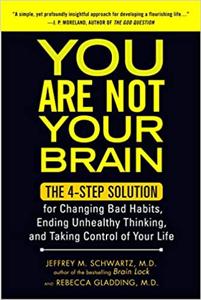
Want to learn the ideas in You Are Not Your Brain better than ever? Read the world’s #1 book summary of You Are Not Your Brain by Jeffrey M. Schwartz, Rebecca Gladding here.
Read a brief 1-Page Summary or watch video summaries curated by our expert team. Note: this book guide is not affiliated with or endorsed by the publisher or author, and we always encourage you to purchase and read the full book.
Video Summaries of You Are Not Your Brain
We’ve scoured the Internet for the very best videos on You Are Not Your Brain, from high-quality videos summaries to interviews or commentary by Jeffrey M. Schwartz, Rebecca Gladding.
1-Page Summary of You Are Not Your Brain
Overview
Have you ever felt stressed out for no reason? If so, you’re not alone. Everyone feels that way sometimes. It’s unpleasant and can make life difficult. Many people spend a lot of time reacting to negative thoughts in their mind. For example, some people feel terrified when they speak in front of an audience; others reject social interaction because their mind tells them they are unworthy of love and affection.
If you are in a situation where you feel like your life is miserable and hopeless, there’s hope. This article will teach you how to recognize the negative thoughts that occur during those times as false messages from the brain, not necessarily “you,” so you can stop yourself from blindly following them. You’ll learn about four steps that will help overpower your brain; how our brains are wired to make us unhappy; and how we can stop our wandering minds from taking us with them.
Big Idea #1: Your brain sends you false messages, but you aren’t defined by them.
Sometimes we get caught up in things that aren’t what we really want to be doing. We also may have a hard time focusing on the right thing when we’re at places where our emotions or thoughts lead us astray from our goals and intentions. These deceptive brain messages are harmful, so they can cause anxiety and overthinking problems.
One of the authors’ clients was a Broadway performer who had stage fright and fear of rejection for years. Eventually, he started to believe that nothing good would ever happen to him.
Aside from his childhood experiences, he was impacted by one moment when he froze in front of a famous Broadway producer. That experience stuck with him and made him focus on his imperfections rather than his positive qualities.
The author’s friend paid attention to the negative messages and started avoiding auditions completely. This response only reinforced the false message in his brain that he was no good.
But he isn’t defined by the deceitful messages that surround him, and you aren’t defined by yours either.
Although we may think that our lives are controlled by the way our brain is wired, it’s not true. We can change how our brains work and overcome obstacles in life.
Big Idea #2: Brain wiring makes habits hard to change and causes intense, uncomfortable sensations.
Why do people keep smoking even though they know it’s bad for them? They’re addicted to nicotine. Why does someone binge on ice cream when they know it will make them fat and unhealthy? Because of the sugar.
It’s because when we engage in an unhealthy behavior, it provides us with a sense of relief from distressing sensations. This temporarily strengthens the habit and makes us more likely to repeat it. For example, one of the authors’ clients was always stressed out by people coming to him for help.
People often use drugs to relieve stress. However, they can end up craving the drug because of their brain’s deceptive messages. For example, if a person thinks “I’m not good enough,” and he tries to get rid of that thought by smoking or drinking alcohol, then he will develop an addiction for those substances.
People tend to feed the monster when they respond to false brain messages. They try to relieve themselves of stress by engaging in unhealthy behavior, but it only makes them feel temporarily better.
We often have negative thoughts about ourselves, which causes us to feel bad. We can get rid of this feeling by changing our thoughts and actions. For example, if we think that we’re disgusting or unlovable, we may try to change those feelings through dieting or purging.





